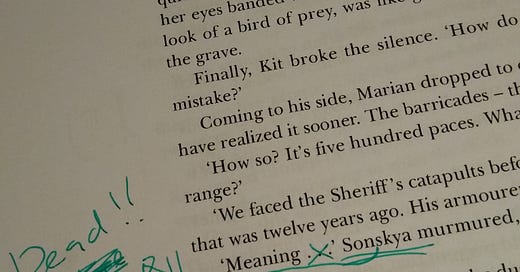For the most part, creating my forthcoming novel, Wildwood Rising, has been a pleasure. I loved scribbling its drafts in freehand; I liked solving its story problems during the rounds of revision; I even enjoyed the painstaking copyedit.
Now, though, I’m immersed in proofreading. It’s the one stage of the process, for a very particular reason, that I don’t like very much.
My publisher, David Fickling Books, employs a professional proofreader to scour the text for typos. But they also send me the typescript in case I spot additional mistakes.
As with my previous novels, there are more of these than I might have expected. Most are minor errors that have crept in while the pages were being typeset: italicised fonts that had reverted to roman; speech marks missing; a page break not marked.
Occasionally, though, I spot something major. For instance, halfway through the novel a character pops up to speak despite having died a hundred pages earlier!
It amazes me, considering how many times the manuscript was read by me and my editors, that such a fundamental mistake could slip through the net. But a novel is a complicated object, I guess, with hundreds of thousands of movable pieces, and a few continuity errors are inevitable.
None of which worries me. It’s all easily fixed. What I really dislike about proofreading is that it rattles the cage of my inner perfectionist.
During the making of my previous book, Dark Fire, I suffered profound writer’s block. In order to conquer it, I had to consciously cultivate an attitude of “good enough.”
The act of proofreading works against that. Going through the pages with a fine-toothed comb, making sure every comma and dash is exactly where it’s supposed to be, reengages my fiercest critical sense. If I’m not careful, rather than examining the sentences for typos, I can find myself picking apart whole scenes to see how they might work better.
As much as I might be proud of Wildwood Rising, and think it makes for a powerful ending to my Blind Bowman trilogy, there are plenty of improvements I’d still like to make. Sections that could be punchier; whole chapters that might be cut away if only I’d structured the story a little differently.
But it’s too late. That’s why proofreading is painful. At this stage, while it’s okay to make minor revisions, major rewrites are just too costly and troublesome. In any case, such changes would be endless. No novel is without faults. At some point you need to send it out into the world with your best blessings, imperfections and all.
But it’s not easy. More than anything, going through the proof pages brings me face to face with my persistent faults and worst habits as a writer. I have a tendency to overwrite, amending a second clause where one would suffice; I’m over fond of ellipses, which slows dialogue for no good reason; I draw out action sequences; I go in for too much character introspection. There is evidence of these proclivities on almost every page of Wildwood Rising, and by and large it’s too late to do anything about it.
But in the final analysis this isn’t as dispiriting as it sounds. Being able to recognise these weaknesses in my craft means there’s plenty of scope for growth. Which means, I hope, that my best work is still ahead of me…
Thanks for being here – and happy reading!
Tim
P.S. Over at Story Voyager,
is concluding her marvellous mini-serial, The Cooperatives. The forth and final instalment is due to arrive today! Catch up with part three below:P.P.S. For anyone who missed it,
and I had a conversation about writing longhand versus word processing. It includes a challenge we’re currently running, and no writer will want to miss out!







If I hadn't started my Substack newsletter, I would still be writing the first short story of my mosaic novel which I began in 2020... Your reflections on proofreading help me understand how hard it is to let go and also how important. I used to write poetry and loved the brevity. There's less to rewrite to perfection.
Great post, Tim. I can understand why proofreading is so hard but I'll bet you are glad that you did it, this time.